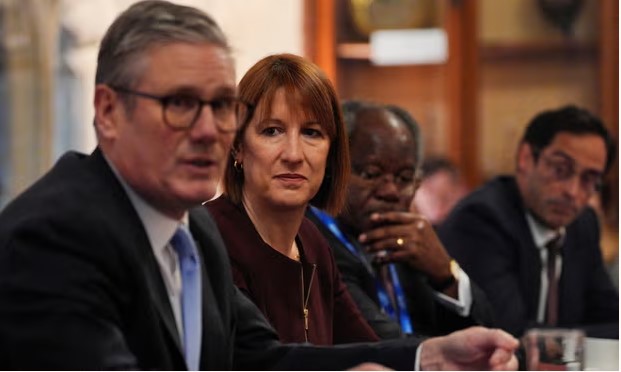
BY Polly Toynbee – The Guardian :
The rumoured rise in national insurance on employers makes sense. As for claims Labour promised not to do that: it didn’t
As the budget approaches, expect more balderdash and hogwash from Labour’s enemies and their foghorn media. Listen to them protest that raising employers’ national insurance would betray the manifesto, making Labour’s pre-election pledge not to put up taxes on working people a blatant lie. But was it?
Labour never said where new taxes would fall, only where they wouldn’t. The manifesto said: “Labour will not increase taxes on working people, which is why we will not increase national insurance, the basic, higher, or additional rates of income tax, or VAT.”
There are two types of class 1 national insurance – one paid by employees and the other by their employers. Labour’s rumoured plans are only for the latter. Most would assume “working people” are not the same as bosses; employees not the same as employers.
Two mighty arbiters of all things economic have taken opposite views. The Institute for Fiscal Studies’ director, Paul Johnson, told Times Radio: “It seems to me that [raising employers’ national insurance] would be a straightforward breach of a manifesto commitment”, because the pledge not to raise national insurance “doesn’t specify employee national insurance”. IFS research suggests that employers tend to pass on the costs to their workers in the form of lower wages.
But the Resolution Foundation’s interim chief executive, Mike Brewer, says: “The fact is, levying employer national insurance on pension contributions, or even raising employer national insurance rates, do not break the letter of the manifesto. Far more importantly, the government has a £40bn hole to fill in terms of preventing further austerity while sticking to its fiscal rules. We should be discussing which would be the least bad tax rises to fill that hole, not the semantics of the language used in party manifestos.”
Parties don’t boast of new taxes before an election, while new governments (except Liz Truss’s) do raise tax in their first budgets. Voters this year said they expected tax rises whoever won, but that’s no guarantee they would have voted for a party that was promising them. Politicians can be economical with the truth, but voters can also be fickle and contrary, wanting public spending but reluctant to pay the price. However, in recent years, plenty of polls have showed voters more willing to pay more tax: 52% told a British Social Attitudes survey they favoured higher taxes, while the Financial Fairness Tracker found that more than half wanted spending increases in public services, even if it meant personally paying more tax.
It is high time for Labour to reframe tax, describing it not as a “burden” but the price for recovery from austerity – and the price we pay for civilisation. But after 14 years in the political wilderness, there was no risk-taking with that famous Ming vase. What if Labour had not voluntarily put on such a straitjacket on the three main taxes? That’s a “what if” that will never be resolved.
The clamour of bogus indignation from the Tories and the Tory press conveniently forgets that during the election campaign, they themselves pointed out Labour’s strategic silence on whether employers’ national insurance might be raised. Laura Trott, the then chief secretary to the Treasury, produced the party’s 12 June document, titled Labour’s 18 Tax Rises, which pointed out: “Labour define ‘no tax rises for working people’ as only ruling out raising employee national insurance, income tax and VAT, not other taxes.” But now the same Laura Trott claims: “[It’s] obvious to all, that hiking employer national insurance is a clear break of Labour’s manifesto.” Both can’t be true.
But that’s flimflam, compared with what the Tories actually did in the run-up to the election. Few governments offer quite such crude tax bribes as Jeremy Hunt’s 4p cut to national insurance, which was not only unaffordable, but done on the never-never, not saying what spending cuts would pay for it. The IFS’s Paul Johnson, writing back then, said: “Actually implementing his plans would require cutting unprotected services – including councils, courts, further education colleges and prisons.”
Nor did that attempted tax bribe shift the electoral dial: years of grinding down public services spurred that great electoral surge to be rid of the Conservatives. It was good to see Mervyn King, the former Bank of England governor, calling the Tory cut to national insurance “reckless” and “irresponsible” in an article for the Independent, and urging a Labour U-turn to reverse it.
National insurance is an anomaly: a lower rate is taken for earnings above a certain threshold, when equalising the rates on higher earnings with those paid by lower earners would bring in £20bn, and levying it on all forms of income, including dividends and earnings from employment by people over the state pension age, would raise a further £12bn, according to Warwick University. (When I reached pension age, my payslip suddenly had no national insurance deducted. Why?) Labour has renounced a rise for workers, but could widen national insurance’s scope to unearned income.
Plentiful fruit ripe for the plucking includes this on Thursday from Prof Arun Advani of CenTax: business and agricultural tax reliefs are among the loopholes that let a quarter of eligible estates worth over £10m pay less than 9% in inheritance tax, while one in six pay less than 4%. It’s an extraordinary disparity, a loss to the Treasury debated on Thursday in parliament’s Westminster Hall.
It’s time that business lobbies protesting over any increase in their taxes faced a resoundingly robust challenge. The Confederation of British Industry told the BBC that raising employers’ national insurance would make it “harder for businesses to create the jobs and the growth” to fund public services. But if they do worry about public services, what would they do?
National insurance on employer pension contributions could raise as much as £17bn a year, and adding 1p to employer national insurance would bring in £8.5bn. No serious interviewer should ever let business lobbyists, or opposition politicians, decry any tax rise that emerges in the budget without saying what they would raise instead, or exactly what services they would cut. And there should be no fudging with “efficiency savings” or the magic of AI. Honesty about taxes deserves at least that.





